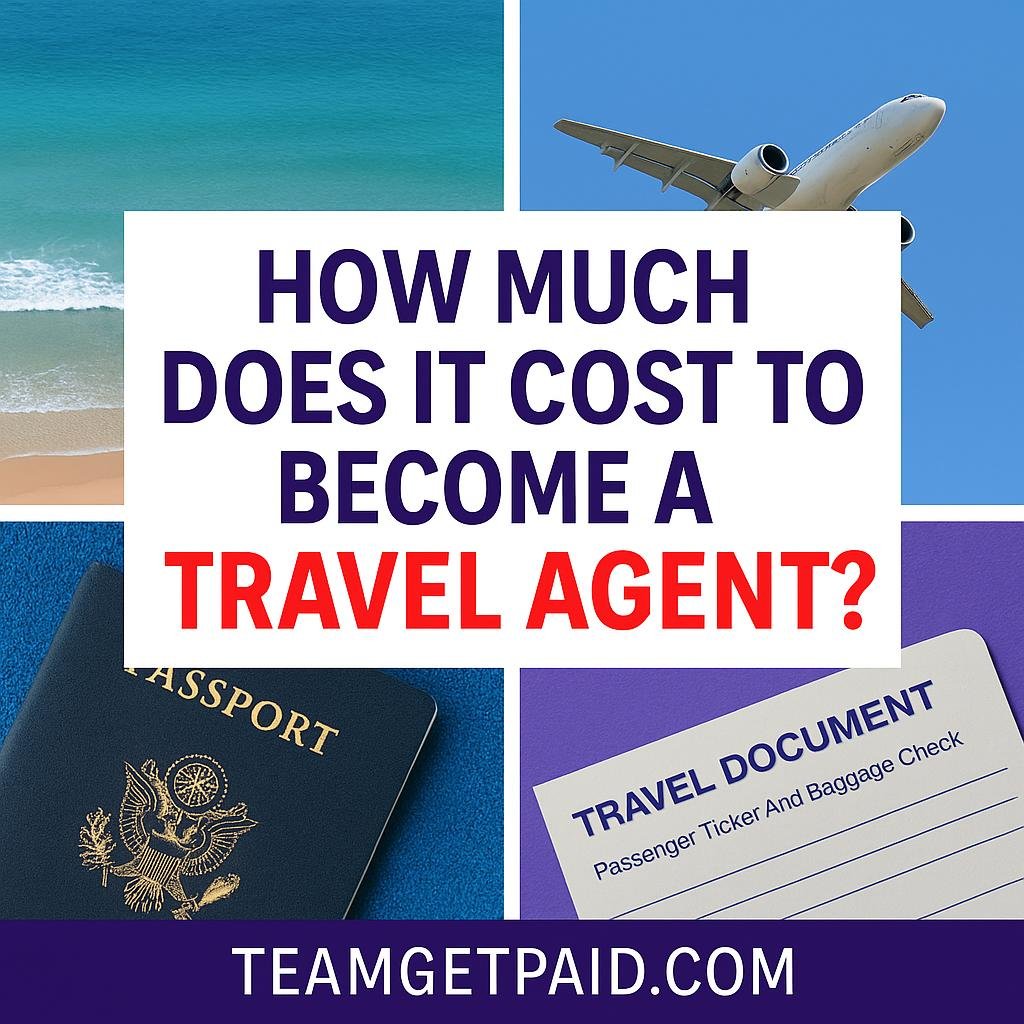How to Be a Travel Agent on the Side: A Step-by-Step Guide for Beginners
Being a travel agent on the side is a flexible way to make extra money while exploring your passion for travel. You can get started as a part-time travel agent by learning the basics, finding a reputable host agency, and using your free time to help others plan their trips.
You don’t need a special degree or years of experience to begin. Many agencies offer training and support, so you can work from home and set your own schedule. This side gig can bring you travel perks, commissions, and the chance to share your travel knowledge.
If you enjoy organizing trips for friends or researching destinations, this is something you can do around your current job. With a few hours a week, you can build your skills and start earning in the travel industry.
Understanding the Role of a Travel Agent
Travel agents help people plan trips, find the best prices, and book flights, hotels, or activities. You work with clients, suppliers, and travel companies to make sure everything runs smoothly and clients get value for their money.
What Does a Travel Agent Do?
A travel agent’s main job is to help customers plan and book their trips. You research destinations, compare prices, and offer advice on flights, hotels, and activities. You may also arrange travel insurance and handle booking changes or cancellations.
Your day might include responding to emails, preparing quotes, and managing reservations. Sometimes, you’ll need to solve problems if a client’s plans change or if there are issues during their trip. Communication and attention to detail are important skills.
You often use booking tools, online platforms, or work with suppliers directly. Some travel agents specialize in certain kinds of travel like cruises, tours, or luxury vacations, while others offer general services.
Types of Travel Agents
Travel agents can work in different ways, depending on your interests and experience. Some work for large agencies, while others are independent contractors or work from home as travel advisors.
Common types include:
| Type | Description |
|---|---|
| In-Agency Agent | Works in a physical office for a travel company |
| Independent Agent | Runs their own business, often from home |
| Online Advisor | Sells travel services online, sometimes virtually |
| Niche Specialist | Focuses on a certain type of travel or destination |
You might choose to specialize if you have a passion for an area, such as group tours or honeymoons. Many side gig agents begin as independent contractors with host agencies, which can provide support and booking tools.
Benefits of Being a Travel Agent on the Side
Working as a part-time travel agent can give you flexibility. You set your hours and decide how many clients to take. This makes it easier to balance with another job or personal commitments.
You may receive travel discounts, special offers, or opportunities for familiarization trips (“fam trips”) that let you experience destinations firsthand. These perks can help you learn more and offer better advice to clients.
Part-time agents often work remotely. Most tasks—including research, booking, and communicating—can be handled online or by phone. You can develop new skills and earn extra income, especially if you build a strong client list through word of mouth or referrals.
How to Become a Travel Agent on the Side
To become a part-time travel agent, you need certain skills and may need to meet some education or licensing standards. Your ability to provide quality service and manage details will affect your success in this field.
Essential Skills and Education
You do not need a formal degree to work as a part-time travel agent. However, strong organizational and communication skills are important. You should be comfortable working with different travel booking systems and using a computer daily.
Customer service skills matter because you work directly with people. Being detail-oriented helps you avoid mistakes with dates, names, or bookings. You should also be good at solving problems calmly.
Some community colleges or trade schools offer short courses in travel and tourism. These can teach you about travel geography, booking software, and industry basics. While not required, this type of education can make you more confident and prepared.
Certifications and Licensing
Certifications are not always required, but having them can make you more trustworthy to clients and suppliers. The International Air Transport Association (IATA) offers an IATA ID card, which may help you access special rates and industry benefits. Some travel agencies may require their agents to get this or similar certifications.
Depending on your country or state, you might need a seller of travel license. This is especially important in places like California, Florida, and Washington. Check the rules where you live to make sure you comply.
Other programs, such as those offered by CLIA (Cruise Lines International Association), provide certificates that focus on cruise travel. While optional, they can help you specialize and improve your skills. A few online training programs from known travel organizations also offer certificates after course completion.
Setting Up Your Side Travel Business
To successfully run a side travel agency, you need to decide how you will operate and handle the legal basics. These first steps help you avoid trouble and build trust with your future clients.
Choosing a Business Model
Think about how you want your travel business to work. You can start your own independent travel agency, which means you run everything by yourself. This gives you full control, but it also means more responsibility.
Another choice is to work as an independent contractor with a host agency. The host agency provides training, support, and access to travel suppliers. You’ll likely pay a fee or share commission. This option is easier for beginners and lets you dive in faster.
Consider your schedule, budget, and how much support you need. Agencies like Fora or other host agencies welcome new agents and offer flexible options. You should also decide if you want to focus on a travel niche. Specializing in cruises, family vacations, or adventure travel can help you find clients more easily.
Registering Your Business
To legally operate your travel agency, you must register your business. Most people start as a sole proprietor or a single-member LLC. An LLC can give you some protection for your personal finances.
Check your state or country’s rules about business licenses and registrations. Some places need a special license to run a travel business. You may also need a federal tax ID, called an EIN, and you might need to collect and pay sales tax.
It’s smart to keep your business and personal money separate. Open a business bank account for your travel agency. This makes it easier to track expenses, handle taxes, and look more professional to your clients.
Working With Travel Agencies and Host Agencies
You can work as a side travel agent by teaming up with travel agencies or using a host agency. Both options help you access tools, suppliers, and support for booking travel.
Partnering With Established Travel Agencies
When you partner with an established travel agency, you connect with a business that already has systems and contracts in place. This saves you from having to find and set up connections with airlines, hotels, and tour companies on your own.
Most agencies offer support for new agents. They may provide training, booking tools, and marketing materials. You’ll often work under their brand and follow their rules.
Here are a few things you can expect:
- Access to supplier networks
- Ready-to-use booking platforms
- Commission splits, often between 50% and 80%
- Lower startup costs than going fully independent
Working with an established agency, you can focus more on helping clients while avoiding complicated business tasks.
Benefits of Joining a Host Agency
Host agencies are companies that help independent agents get started. With a host agency, you usually work as your own business but use their resources and support. This is a good way to avoid the high costs of starting a travel agency from scratch.
Host agencies give you training, higher commission rates through group buying, and access to special travel perks for clients. You also get help with legal paperwork and required registrations.
Benefits include:
- Set-up support and online training
- Use of industry identification numbers
- Back-end office support
- Marketing tools and resources
A host agency lets you focus on sales and service, while they handle much of the setup and day-to-day tasks in the background.
Mastering Travel Tools and Technology
Learning to use travel technology helps you book flights, manage reservations, and issue tickets. You need to understand booking platforms, airline systems, and payment processes like BSP to work efficiently and accurately.
Booking Platforms and Airline Systems
To book flights and hotels, you will use travel booking platforms, often called global distribution systems (GDS). Common GDS options are Amadeus, Sabre, and Travelport. These systems let you access airline seats, hotel rooms, and car rentals in real time.
You will also need to know how to compare prices, check availability, and hold bookings for your clients. GDS platforms require training, but many agencies provide resources or online tutorials.
Some major airlines also have their own booking portals. Using these sites, you can find special deals, add frequent flyer numbers, and handle changes or refunds directly.
You might also use online booking tools like Expedia TAAP or VAX VacationAccess for cruises and vacation packages.
Building Client Relationships and Customer Service
Keeping clients happy is key to your success as a travel agent. You need strong communication skills and a good focus on customer service to make sure clients trust your advice, return for future bookings, and recommend you to others.
Effective Communication Strategies
Listening to your clients is one of the most important skills to have. Ask clear questions about their travel goals, budgets, and preferences. Write down important details so you do not forget them.
Answer questions honestly and provide any travel information they need as soon as possible. If you need more time, let them know and follow up quickly with your answer. Use email, phone, and even instant messages to keep in touch.
Show that you are paying attention by repeating back key points and confirming requests. This builds trust and shows that you care about their experience. Always double-check for any details that affect travel plans, like passport dates or allergies.
Providing Exceptional Customer Service
Great customer service makes you stand out from other travel agents. Stay available during work hours to answer questions or fix problems. Contact clients before, during, and after their trips to make sure everything goes smoothly.
Solve issues as soon as you learn about them. Apologize for mistakes and offer a solution right away. Be polite and patient, even with difficult customers.
You can boost client satisfaction by personalizing trips and giving small extras, like travel tips or local restaurant ideas. Encourage feedback and use it to make your service better in the future.
Marketing Your Part-Time Travel Agent Services
Building a client base as a part-time travel agent relies on strong marketing. Using online platforms and in-person connections, you can share your services and attract customers who are looking for travel help.
Leveraging Social Media and Publications
Share photos and short travel tips on platforms like Instagram, Facebook, and TikTok. Create a simple posting schedule to stay active and relevant. Show your knowledge of destinations, packages, and travel deals.
Join local online groups or travel pages and offer practical advice when people ask for help. Avoid spamming links; instead, focus on being useful. Start a basic newsletter or contribute short articles to community magazines and local publications. Write about common travel questions or recent trips you have planned. With clear contact information, readers can easily reach out for help planning their own vacations.
Networking With Prospective Clients
Start by telling friends, family, and coworkers about your services. Share business cards or flyers at community centers, coffee shops, or local events. Offer to give free travel talks or Q&A sessions at libraries or clubs.
Ask happy clients to refer you to others. A simple note, discount, or thank-you gift encourages referrals. Connect with local businesses, such as gyms or realtors, who may know people interested in booking trips. By making personal connections and staying helpful, you build trust and grow your client list.
Managing Your Time and Balancing Responsibilities
Becoming a travel agent on the side means you need to handle your main job and your travel clients at the same time. Good time management is important for this balance.
Start by setting clear goals for each day and week. Make a simple to-do list and mark off tasks as you finish them. This helps you stay focused and keeps you from feeling overwhelmed.
Limiting distractions is important. Turn off social media alerts and set certain times to check emails or reply to clients. Small changes can help you focus and finish tasks faster.
Here’s a helpful way to split your time:
| Task Type | Time Suggestion |
|---|---|
| Responding to Clients | 30–45 min/day |
| Research & Bookings | 1 hour/day |
| Learning & Updates | 15 min/day |
It helps to be realistic about what you can get done. Don’t book too many clients at once. Make sure you still have time for your main job, family, and yourself.
You can also use technology like scheduling apps or reminders on your phone. Tools like calendars, project lists, and auto-replies can save you time and keep you organized.
Try to keep work times and personal times separate. For example, you might handle travel bookings during lunch breaks or in the evening. This creates a clear boundary between your two roles.
Staying Updated With Industry Trends and Regulations
To be a successful travel agent, it is important to keep up with the latest trends in the travel industry. This includes new destinations, popular travel styles, and new technology.
You should also stay aware of changes to travel rules and regulations. Countries often update entry requirements, visa rules, and safety guidelines. This is especially important when you are helping clients plan their trips.
Here are some ways you can stay updated:
- Attend webinars and workshops
- Join travel agent associations
- Sign up for industry newsletters
- Follow travel news websites
- Participate in travel conferences
Keeping up with these updates helps you give better advice to your clients. It also builds your reputation as a knowledgeable agent.
The table below lists a few resources you can use:
| Resource Type | Examples |
|---|---|
| Industry Associations | ASTA, CLIA |
| Newsletters | Travel Weekly, Skift |
| Online Events | Webinars, virtual travel expos |
| Social Media | LinkedIn travel groups, Facebook pages |
Staying informed is not a one-time task. Make time each month to review new information. Continued learning helps you stay competitive in the fast-changing travel industry.
Frequently Asked Questions
Some people work as travel agents in their spare time to earn extra income and explore their interest in travel. You do not always need formal training, but certain steps and planning are important to succeed.
What qualifications do I need to be a travel agent?
You do not need a specific college degree. Having a high school diploma or GED is usually enough.
Courses in hospitality, geography, or business can help you stand out. Some agencies may require you to complete travel agent training or get certifications.
Can I become a travel agent without any prior experience?
Yes, it is possible to start without previous work in the industry. Many agencies offer training programs for beginners.
Basic skills like good communication, organization, and a passion for travel are helpful.
Is being a travel agent a good side hustle?
You can earn extra money, but income can be irregular at first. Most new agents earn commissions, so your success depends on how many trips you book.
Part-time agents often make a few hundred to a few thousand dollars per year. It may take time to build steady clients.
What steps should I take to start a side business as a travel agent?
Start by researching host agencies that allow part-time agents. Many require a small investment or fee to join.
Complete online training or certification if needed. Register your business if required in your state. Create a plan for how you will find clients.
Where can I find legitimate travel agent jobs for part-time work?
Look for host agencies with good reviews and clear requirements. Avoid companies that ask for large upfront fees for basic training.
You can also find part-time jobs on travel industry job boards or through travel forums.
How can I balance a travel agent side hustle with my full-time job?
Set aside specific hours each week to handle your travel business. Communicate with clients through email or during your free time.
Keep work for your main job and side business separate to avoid conflicts. Use planning tools or a calendar to stay organized.








